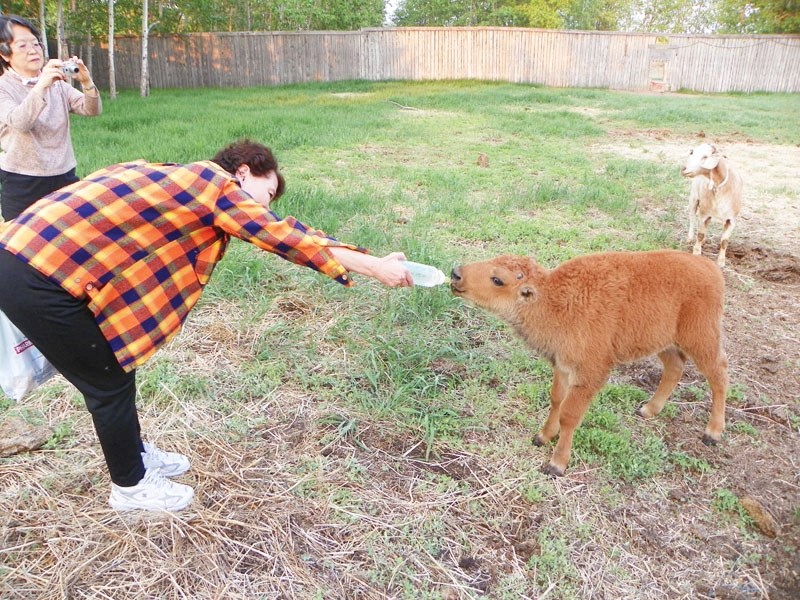According to Kiyoko Komatsu and Tatsue Nagai, Canadians have many things to be thankful for.
The two women from Japan have been visitors to the Lakeland region since May 21, staying with local teacher Mary Koziol, who has been hosting Japanese volunteer teachers for 24 years. Her very first guest ended up connecting her with her two current guests.
"The very first lady who I hosted 24 years ago knows these two ladies and these two ladies told that first lady that their dream of a lifetime is to come to Canada and teach Canadian children origami," Koziol explained. "That's how they connected with me.
"They've had a dream of a lifetime to come to Canada, have homestay experience, and at their age, their dream is coming true."
Komatsu is 69 and Tatsue is 71. They came to improve their English and teach Canadian children origami, and they ended up teaching the students of Duclos and H.E. Bourgoin Schools even more.
Widows and self-proclaimed housewives from Tokyo, Komatsu and Nagai had never held full-time jobs and according to Koziol, it was a shock for them, coming to Canada to work fulltime in the schools.
"They taught everyday, every class, so they've worked very hard," Koziol said.
"In Duclos School, I was very surprised because the school is very beautiful," said Komatsu, adding she was impressed at the small class sizes, and that in Japan, teachers have 40 students. "So it's very, very good for students."
Besides teaching children origami, Komatsu said she was able to teach them some of her "vast experience," including what it was like to live through the massive earthquake that hit Japan earlier this year.
"When the earthquake hit, we hid under tables, and the earthquake was rocking the floor," she said. "It was very, very scary."
She told the students how after the earthquake, shops were giving out free food, water, and blankets. During aftershocks in the subway stations, the trains stopped, and people did not riot, they waited patiently in line without complaining. They supported and helped each other.
Nagai agreed, adding, "Many things changed ... Lifestyles changed. But people never complained."
When they weren't working hard in the schools, Komatsu and Nagai had the opportunity to experience a little bit of Western culture.
They spent Friday, Saturday, and Sunday of rodeo weekend watching the show.
"It was very dangerous and it was very exciting," Komatsu reported. "Rodeo queens were very beautiful!"
They spoke to the rodeo queen contestants a few times, and eagerly had their photo taken with them as well.
After the rodeo, they even had the opportunity to get up on a horse, though it took persuading from Koziol and they refused to ride.
"I had to really persuade the women to do this, because in Tokyo, you cannot. All of these experiences are all first times that they could never do in Tokyo and they have never experienced," Koziol explained.
"It's difficult to ride, it's too tall," Komatsu said, laughing. "We have many short legs."
Nagai added that, even though they didn't ride, it was "very, very cool."
They also had the opportunity to attend the aboriginal showcase in Cold Lake on June 2.
One particular experience that Komatsu was excited about was getting to hold a rifle for the first time.
"That is very good," she said. "In Japan, there are not rifles. Special people can have rifles, but here, many people can have rifles, and I could hold the rifle. We could shoot - that is a very, very good experience for me."
They also experienced the hospitality of the area, particularly at Koziol's home, though they did visit others.
"Canadians are very, very kind and hospitable," said Komatsu. "We had a very good experience."
She said Koziol was "very, very kind, and always thinks about us. Cooking is very good, everything is homemade ... We can eat delicious food every day."
They will return to Tokyo on June 21, taking with them some wooden trees and cowboys, T-shirts straight off the backs of volunteers at the aboriginal showcase, memories of seeing cows, buffalo, and dozens of Canadian geese goslings and, in Nagai's case, a handful of pictures of the sky.
It's a "very, very blue sky," she explained. Koziol added, "She takes pictures of the sky, the beautiful blue sky, because she says in Tokyo, she cannot see the sky."



